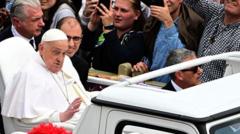As the cardinals prepare to choose a new pope, the contrasting visions set forth by Francis create a rift within the Church’s hierarchy.
Pope Francis Leaves a Divided Legacy for His Successor

Pope Francis Leaves a Divided Legacy for His Successor
Debate Looms Over the Future Direction of the Catholic Church
April 21, 2025, 4:23 a.m. ET
The impending selection of Pope Francis' successor sets the stage for a significant ideological confrontation within the Catholic Church. Will the cardinals uphold Francis' vision of an inclusive, global church, or revert to the more strictly traditional and doctrinaire tactics of past papacies? This pivotal moment presents a challenging legacy for the future leader to navigate.
While Pope Francis initially ignited hopes for rejuvenating church attendance, particularly in the secular West, these aspirations have largely fallen short. Attendance figures have continued to decline in these areas, contrasting with the rising participation rates in the global South. Francis did manage to address the church's ongoing sexual abuse crisis and its often opaque financial dealings, yet the broader trajectory he established may spark heated debates among cardinals regarding its sustainability.
His focus on contentious topics—such as divorce, married priests, acceptance of same-sex couples, and enhancing women's roles within the Church—was met with enthusiasm from liberal members. However, critics argue that these discussions merely set the stage for a possible rollback by a successor inclined to conservative values. The balancing act Francis performed between tough reform and tradition is poised to be a major sticking point in the upcoming conclave.
In stark contrast to the conservative legacies of his predecessors, Pope Francis sought reform by addressing issues like child sexual abuse directly. While he canonized John Paul II, a recent Vatican report raised serious concerns about the late pope’s failure to confront these issues. Francis’ remedy for this involves opening dialogues and embracing differing opinions, breaking from a long history of silencing dissent within the church.
Yet, his assertiveness has not gone unchecked; he ousted or placed under scrutiny several high-ranking conservative clergy who resisted his reforms. Francis also worked diligently to mend relationships with Muslim leaders, where mutual respect and rights protection for Catholic minorities took center stage amid geopolitical tensions.
Ultimately, Francis reshaped not just interreligious dialogue but also the internal composition of the church, appointing bishops and cardinals who reflect his commitment to social justice and environmental concerns. The choices made in the search for his successor will prove instrumental in determining the Catholic Church's path forward—between a more inclusive future or a return to strict tradition.
The impending selection of Pope Francis' successor sets the stage for a significant ideological confrontation within the Catholic Church. Will the cardinals uphold Francis' vision of an inclusive, global church, or revert to the more strictly traditional and doctrinaire tactics of past papacies? This pivotal moment presents a challenging legacy for the future leader to navigate.
While Pope Francis initially ignited hopes for rejuvenating church attendance, particularly in the secular West, these aspirations have largely fallen short. Attendance figures have continued to decline in these areas, contrasting with the rising participation rates in the global South. Francis did manage to address the church's ongoing sexual abuse crisis and its often opaque financial dealings, yet the broader trajectory he established may spark heated debates among cardinals regarding its sustainability.
His focus on contentious topics—such as divorce, married priests, acceptance of same-sex couples, and enhancing women's roles within the Church—was met with enthusiasm from liberal members. However, critics argue that these discussions merely set the stage for a possible rollback by a successor inclined to conservative values. The balancing act Francis performed between tough reform and tradition is poised to be a major sticking point in the upcoming conclave.
In stark contrast to the conservative legacies of his predecessors, Pope Francis sought reform by addressing issues like child sexual abuse directly. While he canonized John Paul II, a recent Vatican report raised serious concerns about the late pope’s failure to confront these issues. Francis’ remedy for this involves opening dialogues and embracing differing opinions, breaking from a long history of silencing dissent within the church.
Yet, his assertiveness has not gone unchecked; he ousted or placed under scrutiny several high-ranking conservative clergy who resisted his reforms. Francis also worked diligently to mend relationships with Muslim leaders, where mutual respect and rights protection for Catholic minorities took center stage amid geopolitical tensions.
Ultimately, Francis reshaped not just interreligious dialogue but also the internal composition of the church, appointing bishops and cardinals who reflect his commitment to social justice and environmental concerns. The choices made in the search for his successor will prove instrumental in determining the Catholic Church's path forward—between a more inclusive future or a return to strict tradition.






















